Film (2014)
Directed by James Marsh
Screenplay by Anthony McCarten
Based on the memoir
Travelling to Infinity: My Life with Stephen by Jane Hawking
Music by Jóhann Jóhannsson; Cinematography by Benoît Delhomme; Film Editing by Jinx Godfrey
With Eddie Redmayne (Stephen Hawking), Felicity Jones (Jane Hawking), Charlie Cox (Jonathan Hellyer Jones), Maxine Peake (Elaine Mason), David Thewlis (Dennis Sciama), Simon McBurney (Frank Hawking), Christian McKay (Roger Penrose), Enzo Cilenti (Kip Thorne)
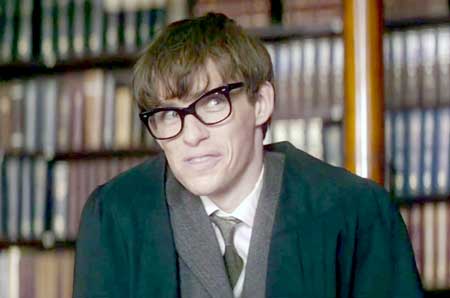
in “The Theory of Everything”
Photo: Focus Features
Stephen Hawking (Eddie Redmayne), a brilliant young Oxford and Cambridge trained cosmologist, began to show symptoms of his ailment, ALS, in his early twenties. Already involved, and in love, with Jane Wilde (Felicity Jones), they wed, despite the dire forecasts for his survival. They produced three children through the thirty-year tenure of their marriage, at which point things broke down.
Jane became involved with someone else, Jonathan Hellyer Jones (Charlie Cox), and Hawking later married Elaine Mason (Maxine Peake), who was his nurse at the time of his breakup with Jane. Despite their divorce, Hawking remained deeply grateful to Jane, who, in the mid-1980s when Hawking was in his forties and suffered a close call with pneumonia, had the opportunity as his spouse to make a decision to refrain from heroic measures save his life. She insisted on those measures, and Hawking has survived for thirty more years.
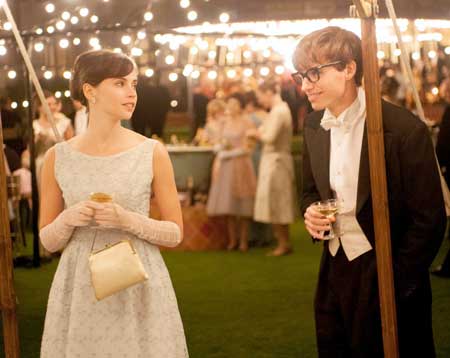
Eddie Redmayne as Stephen Hawking
in “The Theory of Everything”
Photo: Focus Features
Eddie Redmayne does a fantastic job as Hawking. His embodiment of Hawking’s infirmity is shockingly good. Scrunched up in a wheelchair, unable to speak, yet clearly continuing to produce world-shattering contributions to the field, Hawking’s character is heroic. Redmayne manages to convey this vividly, and, as well, to put across the disarming and charming aspects of Hawking’s personality, equally important to his roles as husband and father. It is really a tour de force performance.
Felicity Jones as Jane, Hawking’s first wife, provides a look-you-straight-in-the-face directness and a wonderful resilience. One sees easily, in her portrayal, how Jane was able to stay the course for a very long time and under very difficult circumstances. As well, she shows the vulnerabilities that make her susceptible to what becomes a second significant relationship, and does so, amazingly, without seeming like she has really betrayed Hawking. It’s quite a coup, in its own way.
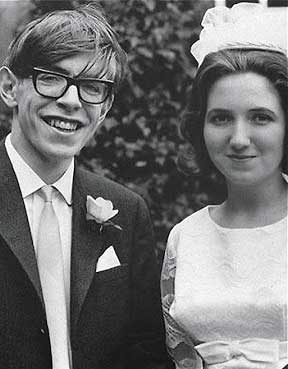
Maxine Peake (Elaine Mason) is the earthy delight that one cheers for, blessing Hawking with love and concern in the wake of his first wife’s divided attentions; she is compellingly appealing in the I just love this guy whatever his ailment role.
Charlie Cox, as Jonathan, the lovably decent usurper of Jane’s affections, is exactly that, not unappealing in any way, handsome, charming and diplomatic.
The script, overall, is beautifully written and makes it all believable. Hawking’s character is nuanced, Jane’s character is delightfully subtle and sensitive, and Elaine’s character is joyously unabashed. The film is well edited and put together. It’s a heartening story, wonderfully told.
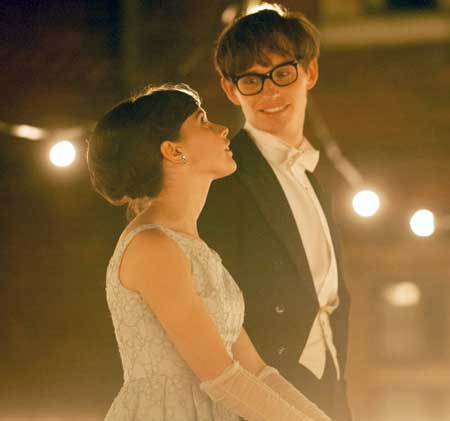
Eddie Redmayne as Stephen Hawking
in “The Theory of Everything”
Photo: Focus Features
That said, the only problem with the film is that it seems to not really be true. It provides a lovely romanticized view of Hawking’s personal life, but the facts, as reported elsewhere, seem quite at odds with the sweetened film version.
Apparently, Jane’s involvement with Jonathan caused Hawking a considerable amount of emotional pain. What, in the film, looks like an innocent and generous domestic involvement by Jonathan into the Hawking household, even residing there for some time with all of them, was, according to other sources, not so easy for Hawking. Apparently, Hawking ultimately sought to get out of his marriage with Jane because of the burden of witnessing her intimacy with Jonathan in Hawking’s own home.
More at odds with the film version are other accounts detailing Hawking’s relationship with Elaine, who, here, seems like a gift from heaven, the most wonderfully supportive wife imaginable. Those other reports indicate that she mistreated him in quite a few ways, sometimes irresponsibly, which led eventually to a quite bitter divorce.
One would have never known any of this from the film which, in its notes at the end said that Hawking was still alive and productive at 72, and that Jane and Jonathan continued to be happily married. There was nothing at all about Hawking’s divorce from Elaine or reports of any of the grounds on which it apparently turned.
In a word, this is a delightful film with fabulous performances and a beautifully written script, but it seems to have rosied up the facts considerably to make a good story. Given that the script is based on Jane Hawking’s memoir, Travelling to Infinity: My Life with Stephen, it is not surprising to find many of the edges, particularly regarding her devotion to Stephen and her romance with Jonathan, smoothed.
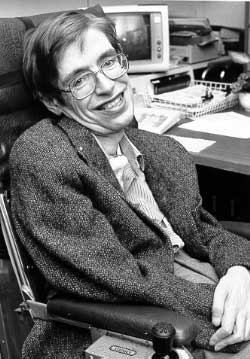
Regardless, however, of the details of Hawking’s relationships, Eddie Redmayne’s performance conveys the incredible story of survival, creativity and heroism in the physically challenged life of one of the great scientific minds of the contemporary world.
– BADMan
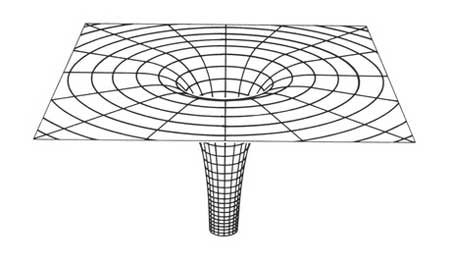
Leave a Reply